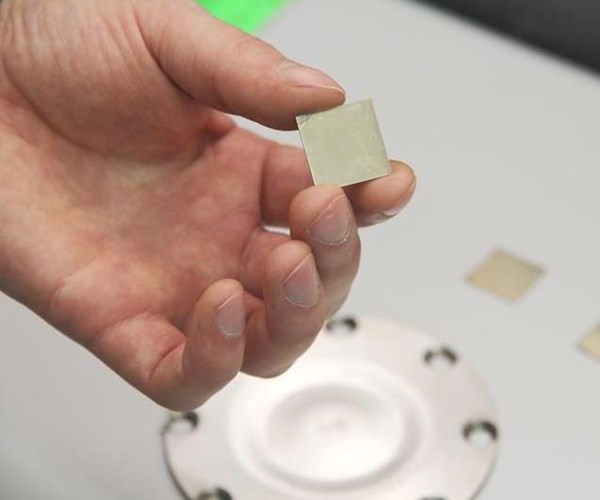Protective Coatings for Fuel Elements Prevent Accidents in Nuclear Reactors
Shells can significantly reduce hydrogenation of containers where nuclear fuel is placed, extend their service life and protect reactors from explosion in case of potential accidents.

A sample of the titanium nitride-based coating. (Photo: Tomsk Polytechnic University)
Research done by a team from the general physics department at Russia's Tomsk Polytechnic University (TPU) is designing protective titanium nitride-based coatings for shells of fuel elements used in nuclear reactors.
The shells can significantly reduce hydrogenation of containers where nuclear fuel is placed, extend their service life and protect reactors from explosion in case of potential accidents.
“In order to form fuel rods within any reactor nuclear fuel is laid in special “tubes” out of zirconium alloys. A nuclear reaction takes place in the fuel rods. As a result of radiolysis of a reactor coolant – water, and due to interaction of the coolant and zirconium under high temperatures hydrogen is released. In such fuel rods shells hydrogen is able to accumulate causing degradation of their mechanical properties and destruction,”says Egor Kashkarov, an assistant in the department.
According to Kashkarov, the higher the temperature in the reactor is, the more hydrogen is released which is caused by the interaction of zirconium and water. For example, the same happened at the Fukusima-1 station in Japan: due to flooding of pumping equipment the active zone of the reactor warmed up to more than 1,200 degrees, a steam-zirconium reaction proceeded swiftly and a large amount of hydrogen was released. The explosion of accumulated hydrogen was one of the causes of the biggest radiation accidents in the world.
The research team from the TPU Department of General Physics is designing protective titanium nitride-based coatings that will serve a barrier protecting zirconium fuel rods from water and hydrogen accumulation.
To read more, please click HERE.
Related Content
-
Understanding and Managing White Spots on Anodized Aluminum
Having trouble with spotting defects when anodizing? Taj Patel of Techevon LLC offers a helpful overview of the various causes of white spots and potential solutions.
-
Corrosion Protection Options for Aluminum
Seeking to understand aluminum corrosion and prevention? Jacob Weingart of Columbia Chemical offers a helpful overview of corrosion protection options for aluminum and its alloys.
-
NADCAP Shop Digitizes to Eliminate Paper Trail
Customizable ERP software has transformed a 27-year-old manual metal finishing job shop into a state-of-the-art paperless company with full digital traceability in about 10 months.















